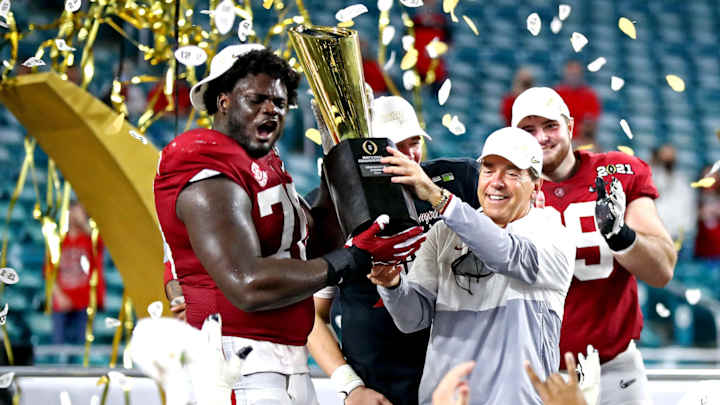Mr. CFB: Why I Changed My Mind on CFP Expansion

During the pandemic college football season of 2020 I talked to a lot of very smart people trying to get an answer to a simple question:
“What’s next?”
One of the very smartest people I know told me this: Life-changing events like the COVID pandemic take trends that are already in place and accelerates them.
And that, my friends, is what’s happening with the College Football Playoff.
Stories this week by Pete Thamel of Yahoo Sports and Heather Dinich of ESPN.com reveal that meetings that will take place in the next few weeks will be crucial in the decision making process to expand or not to expand the current playoff format of four teams.
Thamel, who reached out to as many as a dozen college football stakeholders, reported that there is serious support for a 12-team format.
To the idea of an eight or 12-team playoff, I write a sentence I thought I would never write:
Bring it on.
What I want to share with you today is one old sports writer’s conversion on the playoff.
Understand, that until last season, which was like nothing we’ve ever experienced, I was as hard core as it gets when it came to being against expansion of the playoffs.
I’ve seen what a 68-team NCAA basketball tournament field does to the regular season. Outside of Chapel Hill, Durham, Lexington, Lawrence and a few others, it’s hard to get people jacked up about regular season college basketball.
When we get to February I just want to fast forward to the NCAA tournament, which is one of the great events in all of sport.
One of the things that makes college football special is the weekly tension of knowing that if you lose a game, be it to Alabama or Alabama State, you can be knocked out of the playoff. Teams have rallied from inexplicable losses to make the playoff but once a team drops a game, its margin for error is gone. There is no other sport that has that weekly pressure.
I didn’t want to lose that.
But I have had a change of heart. A few things went into that decision:
**--Since the CFP began seven years ago, a total of 28 playoff bids have been awarded by the selection committee. Of those 28 spots, 22 have gone to only five schools (with number of playoff bids in parentheses):
Alabama (6)
Clemson (6)
Ohio State (4)
Oklahoma (4)
Notre Dame (2)
Six other schools have gone to the playoff once: Georgia (2017), LSU (2019), Washington (2016), Michigan State (2015), Oregon (2014), Florida State (2014).
So that’s 11 schools out of 127 in FBS that have made it to the playoffs in seven years.
That’s 8.6 percent of the FBS teams that have participated in the playoffs.
To be fair, let's just include the Power Five conferences and Notre Dame, which have received all 28 bids. They make up 65 teams. So 16.9 percent of the Power Five has participated in the playoffs.
In basketball almost 20 percent of the 350 Division I teams make the tournament each year. But the tournament is set up to give the little guys a chance with automatic bids for all 32 conferences.
**--Former Big East Commissioner Mike Tranghese always cautions about the law of unintended consequences when big changes are made in college athletics. One of the unintended consequences of the CFP was the recruiting advantage that it created for teams, like Alabama, Clemson, Ohio State and Oklahoma that have gone on a frequent basis.
You know how the conversation goes. A player is being recruited by a team that regularly goes to the playoff—like Clemson or Alabama—and one that does not.
“So you want to prepared for the NFL AND go to the playoffs? Then you need to come here!”
It’s like being an incumbent in politics. It is a built-in advantage. It is a advantage those schools have earned on the field but for the overall health of the game, in my opinion, we just need more teams involved.
**--As time goes on, more and more elite players who are not in the playoffs will opt out of their bowl games. Florida had four players, including tight end Kyle Pitts, the No. 4 overall pick in the NFL Draft, to opt out of the Cotton Bowl against Oklahoma. Had that been a first-round playoff game, it’s a pretty good bet that Pitts and this teammates would have chosen to play instead of sitting out.
It’s pretty simple. Increase the playoff teams from four to eight or 12 and more elite players remain engaged with the college game for a while longer.
That's a good thing.
Before the pandemic, I was convinced that the CFP format would not change until the current contract with ESPN ended after the 2025 regular season.
Now it seems possible, just possible, that the change could be made for the 2023 regular season.
That’s how fast things are moving.
